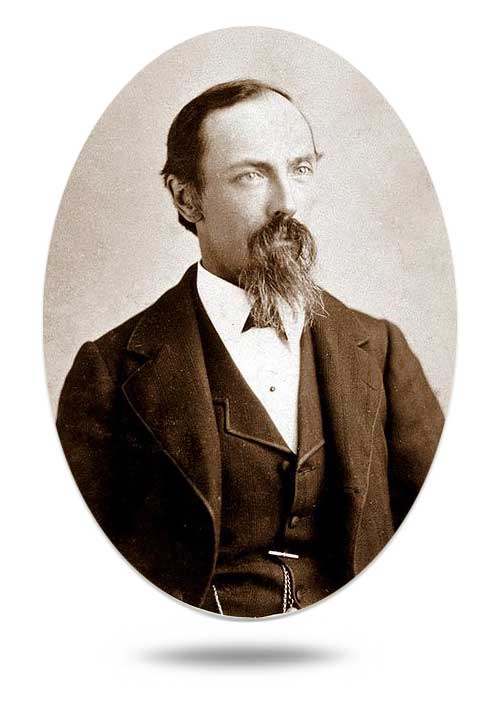On the anniversary of his 180th birthday, the ESPM newsletter catches up with Eugene Hilgard to talk about his legacy and other topical matters.

How have you been?
Well, other than being dead, I’ve been doing quite well. It’s been a wonderful interlude to visit the campus again. My, much has changed here in the past 100 years. I am most pleased to see that a few of the olive trees I planted are still thriving. As you know, only Agricultural Hall had been built when I was still alive. By the way, who is that Wellman fellow? I hope that I am not viewed as immodest, but I am delighted with the design of the building the campus named after me. But after a walk through the structure the other day, it appears that no one has been maintaining it – it’s in worse shape than I am!
We realize that – it's already nearly 100 years old - and we are beginning a campaign to raise funds to remodel it for the next century.
I’ve spoken to a few people during my visit, and it seems to me that many of the problems that the state and the nation face now were things we were concerned with in my time. You might remember that we were greatly concerned about soil and water management, something you folks now call "sustainable agriculture." I recommend you stay on this – I never found an issue that I felt was more important to the state and the nation. It’s a concern that will never go away.
Many of our readers may be unfamiliar with you and your work. Could you say a few words about your history at Cal?
I was recruited away from the University of Michigan, in 1874, by President Gillman, who convinced me that this small University in a cow pasture had a great future. Just as I arrived with my family, Gillman left for Johns Hopkins! My wife was horrified at the conditions: barbarous students, muddy and rutted streets, the nearest social and intellectual life several miles away in Oakland. Well, we made the best of it. Among other things, we helped get the Catholic student center started to provide spiritual balance for some of the rambunctious young men. I used my geological and chemical training to get the Agriculture program on its feet. I had to spar a bit with some of the faculty in the Arts and Humanities, but I knew more languages than most of them, so eventually I was able to make a favorable impression for the agricultural sciences. I am proud that the College of Agriculture – though you now call it the College of Natural Resources – was the first college at Berkeley, and that I served as its Dean for much of my time here.
Probably few of our readers know that in addition to being one of the originators of modern soil science, you were quite a viticulturalist.
Yes, my father (a native of Germany) planted grapes at our home in Illinois. I wrote someone as soon as I arrived here that "California can hardly fail to become one of the the foremost wine-producing countries in the world." Soon, we started research on the dreaded phylloxera pest. We also worked hard on the scientific conception of agricultural pests and their control. I had my own vineyard in San Jose (30 acres), but despite all our efforts, we lost it all to phylloxera! I am proud that the legislature gave Berkeley funding to "pursue the arts and sciences pertaining to viticulture…", though our efforts to raise the quality of California wine were not always appreciated by some of the big producers, who told their clientele to pay no attention to the "judgement of a college professor"!
It's not often we get to ask this of one of our campus founders, but – any advice for Cal in the 21st century?
No, I’ve been away from the activities here a bit too long I am afraid. I will say, in passing, that the principles that we followed as we built this University were: science and education for the public good, an emphasis on theory and basic research, and a proclivity to hire bright young people. I once wrote that Universities like Berkeley must "train teachers and leaders", people who can transform institutions and future generations. I don’t know if that is still useful, but maybe it is worth considering.
